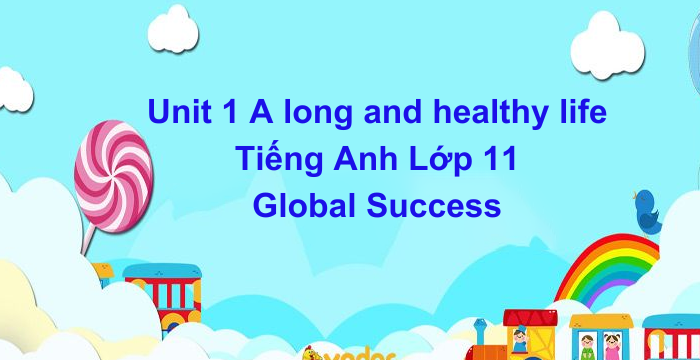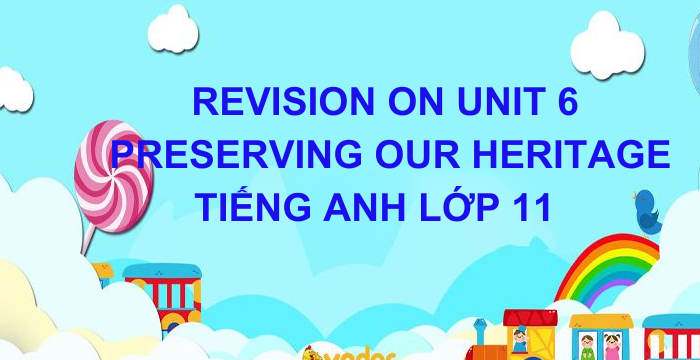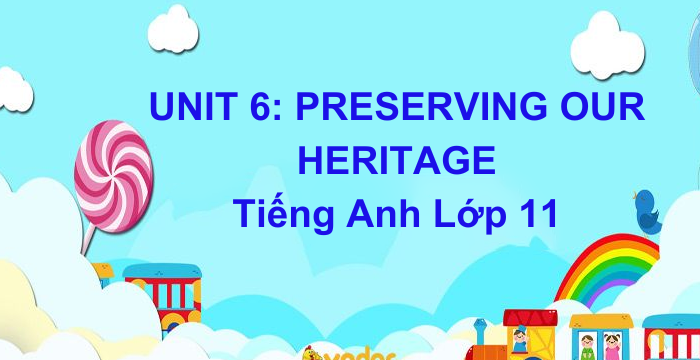Bài Tập Unit 10 The Ecosystem Tiếng Anh Lớp 11 Global Success (1.04.2024)
Thầy Thắng
CHUYÊN ĐỀ LỚP 11
15
Ngày đăng: 01-04-2024 11:27:00

UNIT 10. THE ECOSYSTEM
A. LÝ THUYẾT
I. VOCABULARY
1. VOCABULARY
2. COLLOCATIONS/ PHRASES
|
No. |
Word |
Part of speech |
Pronunciation |
Meaning |
|
|
break down |
(vp) |
/breɪk/ /daʊn/ |
phá vỡ |
|
|
cut down |
(vp) |
/kʌt/ /daʊn/ |
chặt |
|
|
run out (of) |
(vp) |
/rʌn/ /aʊt/ /ɒv/ |
cạn kiệt |
|
|
located in |
(phrase) |
/ləʊˈkeɪtɪd/ /ɪn/ |
nằm ở |
|
|
native to |
(adj) |
/ˈneɪtɪv/ /tuː/ |
tự nhiên, bản địa |
|
|
home to |
(phrase) |
/həʊm/ /tuː/ |
là nhà của |
|
|
loss of biodiversity |
(phrase) |
/lɒs/ /əv/ /ˌbaɪəʊdaɪˈvɜːsəti/ |
sự mất đa dạng sinh học |
|
|
carbon footprint |
(np) |
/ˈkɑːbᵊn/ /ˈfʊtprɪnt/ |
lượng khí thải các bon |
|
|
coral reef |
(np) |
/ˈkɒrəl/ /riːf/ |
rạn san hô |
|
|
fishing cat |
(np) |
/ˈfɪʃɪŋ/ /kæt/ |
mèo cá |
|
|
food chain |
(np) |
/fuːd/ /ʧeɪn/ |
chuỗi thức ăn |
|
|
food security |
(np) |
/fuːd/ /sɪˈkjʊərəti/ |
an ninh lương thực |
|
|
forest fire |
(np) |
/ˈfɒrɪst/ /ˈfaɪə/ |
cháy rừng |
|
|
fossil fuel |
(np) |
/ˈfɒsᵊl/ /ˈfjuːəl/ |
nhiên liệu hoá thạch |
|
|
great spotted eagle |
(np) |
/ɡreɪt/ /ˈspɒtɪd/ /ˈiːɡᵊl/ |
đại bàng đốm lớn |
|
|
green job |
(adj-n) |
/ɡriːn/ /ʤɒb/ |
công việc liên quan đến môi trường |
|
|
life expectancy |
(np) |
/laɪf/ /ɪkˈspektᵊnsi/ |
tuổi thọ |
|
|
living things |
(adj-n) |
/ˈlɪvɪŋ/ /θɪŋz/ |
những sinh vật sống |
|
|
mangrove forest |
(np) |
/ˈmæŋɡrəʊv/ /ˈfɒrɪst/ |
rừng ngập mặn |
|
|
marine reserve |
(np) |
/məˈriːn/ /rɪˈzɜːv/ |
khu bảo tồn biển |
|
|
national park |
(adj-n) |
/ˈnæʃᵊnᵊl/ /pɑːk/ |
rừng quốc gia |
|
|
natural resources |
(adj-n) |
/ˈnæʧrəl/ /rɪˈsɔːsɪz/ |
tài nguyên thiên nhiên |
|
|
no-take zone |
(np) |
/nəʊ/-/teɪk/ /zəʊn/ |
vùng được bảo tồn (không được lấy đi thứ gì) |
|
|
oil drilling |
(np) |
/ɔɪl/ /ˈdrɪlɪŋ/ |
sự khoan dầu |
|
|
raw material |
(adj-n) |
/rɔː/ /məˈtɪərɪəl/ |
nguyên liệu thô |
|
|
scuba diving |
(np) |
/ˈskuːbə/ /ˈdaɪvɪŋ/ |
môn lặn |
|
|
tropical forest |
(adj-n) |
/ˈtrɒpɪkəl/ /ˈfɒrɪst/ |
rừng nhiệt đới |
|
|
water level |
(np) |
/ˈwɔːtə/ /ˈlevᵊl/ |
mực nước |
3. WORD FORMATION
|
No. |
Word |
Part of speech |
Pronunciation |
Meaning |
|
|
nature |
(n) |
/ˈneɪʧə/ |
tự nhiên, thiên nhiên |
|
|
natural |
(adj) |
/ˈnæʧᵊrᵊl/ |
(thuộc) tự nhiên, (thuộc) thiên nhiên |
|
|
naturally |
(adv) |
/ˈnæʧrəli/ |
(thuộc) tự nhiên, (thuộc) thiên nhiên |
|
|
restore |
(v) |
/rɪsˈtɔː/ |
khôi phục |
|
|
restoration |
(n) |
/ˌrestəˈreɪʃᵊn/ |
sự phục hồi |
|
|
conserve |
(v) |
/kənˈsɜːv/ |
bảo tồn |
|
|
conservation |
(n) |
/ˌkɒnsəˈveɪʃᵊn/ |
sự bảo tồn |
|
|
disappear |
(v) |
/ˌdɪsəˈpɪə/ |
biến mất |
|
|
disappearance |
(n) |
/ˌdɪsəˈpɪərᵊns/ |
sự biến mất |
|
|
destroy |
(v) |
/dɪˈstrɔɪ/ |
phá huỷ |
|
|
destruction |
(n) |
/dɪsˈtrʌkʃᵊn/ |
sự phá huỷ |
|
|
danger |
(n) |
/ˈdeɪnʤə/ |
sự nguy hiểm |
|
|
endangered |
(adj) |
/ɪnˈdeɪnʤəd/ |
bị đe dọa |
|
|
ecology |
(n) |
/ɪˈkɒləʤi/ |
sinh thái học |
|
|
ecological |
(adj) |
/ˌiːkəˈlɒʤɪkᵊl/ |
thuộc sinh thái học |
II. PRONUNCIATION
TÔNG GIỌNG TRONG CÂU HỎI ĐUÔI
|
Tông giọng |
Cách dùng |
Ví dụ |
|
Xuống |
Khi chúng ta chắc câu trả lời là đúng hoặc ta nghĩ rằng người trả lời sẽ xác nhận câu nói đó là đúng hoặc chúng ta muốn nhẹ nhàng thuyết phục người trả lời. |
A: This is a dangerous place, isn’t it? æ B: Yes. You are right. |
|
Khi chúng ta muốn nói lên suy nghĩ của mình |
It is a beautiful dress, isn’t it? æ |
|
|
Lên |
Khi chúng ta không chắc chắn câu trả lời là đúng |
A: He will be here, won’t he? æ B: Yes, he will. |
III. GRAMMAR
DANH TỪ GHÉP
1. Định nghĩa
- Danh từ ghép được cấu tạo từ 2 từ trở lên.
- Các danh từ ghép có thể viết liền (highway), dùng gạch nói (forget-me-not), hoặc tách riêng (coffee maker).
- Trong trường hợp danh từ đầu tiên mang ý nghĩa số nhiều thì nó vẫn mang hình thức số ít. Ví dụ: car park
- Số nhiều của danh từ ghép nằm ở cuối danh từ ghép (parking lots). Một vài trường hợp ngoại lệ như clothes shop, passers-by
2. Cách thành lập danh từ ghép
- Danh từ + danh từ: bathroom (phòng tắm), school bus (xe buýt của trường), coffee shop (quán cà phê), computer desk (bàn để máy tính), bedroom window (cửa sổ phòng ngủ), office building (toà nhà văn phòng)
- Tính từ + danh từ: greenhouse (nhà kính), blackboard (bảng đen), hardcover (bìa cứng sách), sweetheart (người yêu thương), darkroom (phòng chụp ảnh tối), softball (bóng mềm)
- Từ đuôi -ing + danh từ: washing machine (máy giặt), swimming pool (bể bơi), cooking class (lớp học nấu ăn), reading corner (góc đọc sách), writing desk (bàn ngồi viết), running track (đường chạy)
- Danh từ + từ đuôi -ing: tea-making (pha trà), coffee-brewing (pha cà phê), cake-decorating (trang trí bánh), book-reading (đọc sách), speech-giving (phát biểu), party-planning (tổ chức tiệc)
- Động từ + giới từ: breakup (chia tay, vỡ), check-in (sự kiểm tra), backup (sao lưu), breakdown (sự hỏng hóc), log-in (đăng nhập), holdup (sự trì hoãn)
B. THỰC HÀNH
Task 1. Find the word whose underlined part differs from the other three in pronunciation in each of the following questions.
1. A. resource B. destroy C. delta D. essential
2. A. native B. habitat C. natural D. mammal
3. A. snorkeling B. provide C. restore D. flora
4. A. reserve B. diversity C. ecosystem D. conserve
5. A. ideal B. survival C. fossil D. wildlife
6. A. species B. tropical C. coral D. ecological
7. A. continent B. creature C. alternative D. expectancy
8. A. shelter B. invest C. wetland D. declare
9. A. scuba B. overuse C. fuel D. hunt
10. A. nature B. fascinating C. marine D. endangered
Task 2. Find the word that differs from the other three in the position of stress in each of the following questions.
1. A. flora B. fauna C. destroy D. delta
2. A. resource B. native C. restore D. declare
3. A. provide B. reserve C. mammal D. marine
4. A. habitat B. natural C. scenery D. overuse
5. A. survival B. continent C. pangolin D. essential
6. A. endangered B. snorkeling C. cruelty D. waterway
7. A. freshwater B. located C. tropical D. national
8. A. alternative B. expectancy C. biological D. diversity
9. A. restoration B. ecological C. conservation D. fascinating
10. A. material B. ecosystem C. organism D. security
II. VOCABULARY
Task 1. Write the name under each picture.
pangolin fishing cat great spotted eaglekoala mangrove forest coral reef
|
1. __________________ |
2. __________________ |
|
3. __________________ |
4. __________________ |
|
5. __________________ |
6. __________________ |
Task 2. Match the words/ phrases on the left with their meanings on the right.
|
1. mammal |
a. thick forest that grows in hot parts of the world |
|
2. flora |
b. any animal that feeds its young on milk |
|
3. fauna |
c. the protection of plants and animals, natural areas, etc. from the damage |
|
4. biodiversity |
d. all the plants of a particular place or from a particular period |
|
5. habitat |
e. a series of living things that are connected because each group of things eats the group below it in the series |
|
6. ecosystem |
f. all the animals that live wild in a particular area |
|
7. conservation |
g. the number and types of plants and animals that exist in a particular area or in the world generally |
|
8. species |
h. the natural environment in which an animal or plant usually lives |
|
9. food chain |
i. all the living things in an area and the way they affect each other and the environment |
|
10. tropical forest |
j. a set of animals or plants which have similar characteristics to each other |
Task 3. Fill in each blank with a suitable phrase from Task 2. Change the verb and noun forms if necessary.
1. _____________________ is essential for a healthy _____________________ because it ensures a variety of species can coexist.
2. The Amazon is the world’s biggest _________________ with diverse flora and __________________.
3. Many _____________________; for example, elephants and giraffes eat primarily plants.
4. The ___________________ of many animals is being threatened by deforestation and natural disasters.
5. _____________________ efforts are crucial to protect endangered species and maintain a balanced ecosystem.
6. The _____________________ in the wetlands provide shelter and food for numerous types of birds and fish.
7. The decline in certain _____________________ can have negative effects on the entire ecosystem.
8. The marine __________________ begins with tiny organisms and ends with large animals like sharks.
Task 4. Complete each sentence using the correct form of the word in brackets.
1. Conservation organisations work tirelessly to protect _____________________ species. (DANGER)
2. The ___________________ of certain plant species can negatively affect the balance of the ecosystem. (DISAPPEAR)
3. Efforts to _____________________ damaged wetlands have been successful, bringing back native plants and animals. (RESTORATION)
4. The ___________________ of rainforests is a major concern for the global environment. (DESTROY)
5. Human activities, such as deforestation and pollution, do harm to _____________________ habitats of many animals. (NATURE)
6. The study of ecology helps US understand how _____________________ organisms interact with each other and their environment. (LIVE)
7. The conservation projects aim to minimise the _____________________ damage caused by human activities. (ECOLOGY)
8. Climate change and pollution can contribute to _____________________ of biodiversity in the area. (LOSE)
Task 5. Complete each sentence with one suitable phrase from the box. Change the form of the word if necessary.
cut down run out of home to break down native to
1. If we continue to overuse our natural resources, we may ____________________ them.
2. The Amazon rainforest is ____________________ a vast range of plant and animal species.
3. Overfishing is one of the reasons leading the marine ecosystem to ____________________.
4. Non-native species can pose a threat to species which are ____________________ a particular region.
5. Deforestation is a serious environmental issue which involves ____________________ trees on a large scale.
Task 6. Choose the correct word to complete each sentence.
1. A no-take zone / national park is a protected area where no fishing or hunting is allowed, aimed at conserving marine life.
2. Providing shelter / cruelty and protection for young animals is an important part of ensuring their survival in the wild.
3. Many countries have taken steps to ban / declare the hunting of endangered species to protect their populations.
4. Food security / Bird-watching is a relaxing activity that allows you to observe various species in their natural habitat.
5. Many people now do green jobs / raw materials, like recycling or taking care of parks, to help protect the environment.
6. To deal with climate change, it’s important to invest in alternative / ideal energy sources and reduce our reliance on carbon footprint / fossil fuels.
7. Snorkelling / Oil drilling in the Great Barrier Reef is a fascinating way to explore the marine ecosystem.
8. The overuse / launch of a new environmental law aims to promote the sustainability of natural resources / forest fire.
9. Living / Non-living things like rocks, water and soil playa role in shaping the landscape within an ecosystem.
10. Improved living conditions have led to an increase in life expectancy / wetlands in many parts of the world.
III. GRAMMAR
Task 1. Use the words in the box to make compound nouns, then match them to the suitable definitions below.
|
wild |
water |
bird |
scuba |
life |
|
over |
way |
diving |
watching |
wet |
1. A path or route for the flow of water, such as a river or canal. ___________________
2. Animals that live independently of people, in natural conditions. ___________________
3. A large area of land covered with swamp or marsh. ___________________
4. The fact that something is used too often or too much, often leading to harm. ___________________
5. The activity of observing birds in their natural environment. ___________________
6. The sport of swimming underwater with special breathing equipment. ___________________
Task 2. Choose the correct word to make compound nouns that match their definitions.
1. Food system / chain: The order in which animals eat plants and each other in nature
2. Green / Blue job: A type of work that helps the environment, like recycling or planting trees
3. Forest burn / fire: A burning in an area of land with many trees, that is difficult to control
4. Mangrove / green forest: A kind of forest near the ocean with trees that grow in salty water
5. Rawing / Raw material: Anything like wood, oil or cotton in its natural condition before used to make other things
6. National garden / park: An area that is protected by the government because of its natural beauty and importance to history
7. Fishing / Fish cat: A kind of wild cat that likes to catch fish to eat
8. Coral rock / reef: An area of coral, the top of which can sometimes be seen just above the sea
9. No-take / No-get zone: A place where people can’t fish or hunt, so the animals and plants are protected
10. Non-living / life: Something that isn’t alive, like rocks or water.
Task 3. Match a word on the left with a word on the right to make compound nouns, then fill in each blank with one suitable compound noun.
1. The burning of _____________________ contributes to air and water pollution, negatively affecting the environment.
2. _____________________ are established to protect and conserve the rich biodiversity found in oceans.
3. Reducing _____________________ is an effective measure to reduce the impact of climate change on the ecosystem.
4. Sustainable farming practices can help ensure __________________ while protecting the environment.
5. The improvements in healthcare have increased ____________________ in many regions in the world.
6. It is crucial to preserve _____________________, such as clean water, forests and coal for future generations.
7. Climate change can lead to rising _____________________ threatening people’s lives in coastal areas.
8. _____________________ in the ocean may have harmful effects on marine ecosystems.
9. The _____________________ is home to various species of plants and animals.
10. Conservationists make great efforts to protect _____________________ from extinction and maintain biodiversity.
IV. READING
Task 1. Read the following passage and mark the letter A, B, C or D to indicate the correct word or phrase that best fits each of the numbered blanks.
Enric Sala is a full-time conservationist as a National Geographic Explorer in Residence. In 2008, he founded National Geographic Pristine Seas, a project that combines exploration, research, public policy and media to inspire the creation of marine protected areas. The project aims to protect at least 30 percent of the ocean by 2030 for the benefit of nature and humanity (1) _________ less than eight percent is currently protected.
The ongoing marine (2) _________ efforts are an expression of a lifelong passion for Sala. He says. “The exotic places, the daring underwater explorers, the spectacular (3) _________. It was all I wanted to do with my life,” he adds. “Sometimes dreams do come true.”
“Over the last century alone, we (4) _________ over 90 percent of the ocean’s large fish, yet less than eight percent of the ocean is under some kind of protection. We’re still learning about the damage from fishing activities, like bottom trawling, (5) _________ negatively affects the ocean floor - the world’s largest carbon storehouse,” Sala writes. “But it is possible to (6) _________ the ocean’s benefits to people and the planet. (7) _________ we must do is rewild the sea. The only catch is that we can’t wait. We have less than a decade to act.”
Sala claims that preserving the planet’s wild places, on land and in the ocean, is a matter (8) _________ human survival and economic importance in his book, The Nature of Nature: Why We Need the Wild, published in 2020. The process of rewilding, or restoring and protecting natural processes, “allows nature (9) _________ the hard work for us,” he explains.
“Our natural world can be a (10) _________ engine of regeneration, we just need to give it some space,” he adds, citing wildlife restoration successes in Yellowstone and Mozambique national parks, and the Southern Line Islands.
1. A. because B. and C. but D. although
2. A. protector B. protect C. protected D. protection
3. A. creatures B. resources C. materials D. goods
4. A. removed B. are removing C. have removed D. remove
5. A. which B. what C. that D. where
6. A. launch B. restore C. destroy D. invest
7. A. Any B. Every C. One D. All
8. A. on B. for C. of D. from
9. A. doing B. to do C. do D. to be done
10. A. sustain B. sustainably C. sustainable D. sustainability
Task 2. Read the passage and decide whether the following statements are true (T), false (F) or not given (NG).
An ecosystem is a geographic area where plants, animals, and other organisms, as well as weather and landscape, work together to form life. Ecosystems contain living parts, as well as non living parts. Living parts include plants, animals, and other organisms. Nonliving parts include rocks, temperature, and humidity.
Every factor in an ecosystem depends on every other factor, either directly or indirectly. A change in the temperature of an ecosystem will often affect what plants will grow there, for instance. Animals that depend on plants for food and shelter will have to adapt to the changes, move to another ecosystem.
The whole surface of Earth is a series of connected ecosystems. Ecosystems are often connected in a larger biome. Biomes are large sections of land, sea, or atmosphere. Forests, ponds and reefs are all types of biomes, for example. They’re organised very generally, based on the types of plants and animals that live in them, within each forest, each pond or each reef, you’ll find many different ecosystems. The biome of the Sahara Desert, for instance, includes a wide variety of ecosystems. The Sahara has oasis ecosystems which have palm trees and animals such as crocodiles, and dune ecosystems, which have animals such as snakes or scorpions.
For thousands of years, people have interacted with ecosystems. As human populations have grown, however, people have overtaken many ecosystems and done harm to them. For example, human activity threatens all rain forest ecosystems in the Amazon. Thousands of acres of land are cleared for farmland, housing, and industry. Cutting down trees to make room for crops such as soy and corn benefits many poor farmers. However, the destruction of rain forest ecosystems has its costs.
Many modern medicines have been developed from rainforest plants. Many scientists worry that destroying the rainforest ecosystem may prevent more medicines from being developed.
Ecosystems can recover from destruction, however. Individual people, cultures, and governments are working to preserve ecosystems that are important to them.
___________ 1. Living things include plants and rocks while non-living things include animals and temperature.
___________ 2. Factors in an ecosystem have effects on each other.
___________ 3. Biomes, which are sections of land, sea, or atmosphere, are larger than ecosystems.
___________ 4. Biomes are organised based on the types of plants and animals found in them.
___________ 5. The Sahara Desert biome contains oasis ecosystems with palm trees and snakes.
___________ 6. Cutting down trees for farmland in the rainforest benefits rich farmers.
___________ 7. Human activity poses a threat to rainforest ecosystems in the Amazon.
___________ 8. Rainforest plants have contributed to the development of modern medicines.
___________ 9. Damaging rainforest ecosystems has no negative consequences.
___________ 10. It is challenging for people and governments to recover ecosystems from damage.
Task 3. Read the following passage and choose the correct answer to each of the following questions.
Extinction is part of life on Earth. Through much of our planet’s history, species have been forming, evolving and eventually disappearing. Today, however, human activities have dramatically sped up the process. The Earth is losing animals, birds, and other living things so fast. There are many different views about why protecting it is important.
Conservation biology is a scientific field with a mission: protecting and restoring biodiversity around the world. Michael Soulé, one of the field’s founders, argued that biological diversity is good and should be conserved because it has intrinsic value. He also proposed that conservation biologists should act to save biodiversity even if sound science isn’t available to inform decisions.
Many researchers do research on the value of ecosystems to humans. They reached a conclusion that the total economic value of the world’s ecosystems was worth an average US$33 trillion per year in 1997 dollars. At the time, this was nearly twice the global value of the entire world’s financial markets. This estimate included services such as predators controlling pests that would otherwise destroy crops; wetlands, mangroves and other natural systems protecting coastlines against storms and flooding; oceans providing fish for food; and forests providing wood and other building materials. A second group began to quantify the non-monetary value of nature for human health, happiness and well-being. Their research found that spending time in nature tended to reduce blood pressure, lower hormones related to stress and anxiety, decrease depression and improve cognitive function.
By 2010, scientists had published more than 600 experiments over 500 groups of organisms in freshwater, marine and land ecosystems. In a 2012 review of these experiments, it is found that when ecosystems lose biodiversity, they become less efficient and less productive. And they are less able to deliver many of the services that benefit human well-being. For example, we found that loss of tree diversity reduced the amount of wood that forests produced, that oceans with fewer fish species produced less-reliable catches, and that ecosystems with lower plant diversity were more easily influenced by diseases.
Research clearly shows that nature provides humanity with enormous value. It is important to make everyone get involved in conserving Earth’s ecosystems and living creatures for the good of all.
1. Which of the following can be the best title for the passage?
A. Reasons for Biodiversity Preservation B. The Value of Ecosystem Services
C. The Loss of Species on Earth D. Conservation Biology: A Scientific Field
2. The word ‘intrinsic’ in paragraph 2 is closest in meaning to __________.
A. economic B. normal C. essential D. unnecessary
3. According to paragraph 2, which of the following is TRUE about conservation biologists?
A. They should only act when sound science is available.
B. They should not be concerned with biodiversity conservation.
C. They should act to save biodiversity, even without sound science.
D. They should focus solely on studying species extinction.
4. The word ‘quantify’ in paragraph 3 is closest in meaning to __________.
A. guess B. declare C. consider D. measure
5. According to paragraph 3, how did spending time in nature affect human health?
A. It increased the level of stress and anxiety.
B. It had no impact on cognitive function.
C. It helped to reduce stress-related hormones.
D. It decreased blood pressure and increased depression.
6. According to paragraph 3, which of the following is NOT mentioned as one of the ecosystem services included in the estimate?
A. controlling pests B. protecting against storms and flooding
C. providing fish for food D. producing fruits and vegetables
7. The word ‘they’ in paragraph 4 refers to __________.
A. scientists B. ecosystems C. organisms D. experiments
8. According to paragraph 4, what is one example of the negative impact of biodiversity loss?
A. Loss of tree diversity reduces wood production in forests.
B. Oceans with fewer fish species have more reliable catches.
C. Ecosystems with lower plant diversity are less affected by diseases.
D. The diversity of trees increases wood production in forests.
9. Which of the following can be inferred from the passage?
A. Ecosystems with higher biodiversity are more efficient.
B. Biological diversity should be conserved only due to its monetary value.
C. Spending time in nature has negative impacts on human health.
D. The loss of biodiversity can make ecosystems become stronger.
10. Which of the following is NOT true according to the passage?
A. The value of the world’s ecosystems was greater than that of financial markets in 1997.
B. Conserving Earth’s ecosystems and living creatures is essential for the benefits of all.
C. Nature’s nonmonetary value for human health includes reducing stress and anxiety.
D. Human activities have slowed down the process of species extinction on Earth.
V. WRITING
Task 1. Write meaningful sentences based on the given clues (form of the verb can be changed if necessary)
1. The Great Barrier Reef / home / variety / marine creatures.
_______________________________________
2. Sunda pangolins / endangered mammals / that / native / Southeast Asia.
_______________________________________
3. If / we / not / take action / protect / our forests, / we / may / run out / valuable resources.
_______________________________________
4. Scuba diving / allow / us / explore / fascinating / underwater ecosystems / coral reefs.
_______________________________________
5. forests / which / located / coastal regions / provide / protection / storms.
_______________________________________
Task 2. Rewrite each sentence using the given word in brackets as long as its meaning stays the same as the original one.
1. The rise in green jobs has positive effects on the conservation of ecosystems. (BENEFICIAL)
-> The rise ____________________________
2. The destruction of the rainforest can badly affect the survival of many species. (THREATEN)
-> The destruction ____________________________
3. If we continue to use our natural resources too much, we will cause loss of biodiversity. (OVERUSE)
-> If we ____________________________
4. Both individuals and governments should take responsibility for protecting the environment. (RESPONSIBLE)
-> Both ____________________________
5. Conservation organisations are of great importance to protect rare species from hunting. (ROLE)
-> Conservation organisations ____________________________
Task 3. Write an essay (180-200 words) about the reasons why we should protect endangered species based on the following ideas
■ support people’s life
■ maintain biodiversity
■ provide health and cultural benefits
____________________________
____________________________
____________________________
____________________________
____________________________
VI. LISTENING
Task 1. Listen to a talk about ecosystem restoration and fill in each blank with one suitable word. You can listen to the recording TWICE.
Negative effects of harming ecosystems
- lose one million (1) ________________________ in the next few decades
- lose coral reefs, impacting fish, (2) ________________________ and economies
- weaken ecosystems, making them (3) ________________________ carbon
- make soil less (4) ________________________ and pollute healthy soil
- lose forests, causing ‘Zoonotic disease’ like bird flu, Ebola and Covid-19
Ways for ecosystem (5) ________________________
- grow trees in cities to cut pollution (6) ________________________, improving our health and reducing global warming
- restore (7) ________________________ to protect coastlines from storms and floods
- build economies around nature to create jobs for the future
- call entrepreneurs, thinkers, leaders to get (8) ________________________
Task 2. Listen to a conversation about biodiversity and choose the correct answer to each of the following questions. You can listen to the recording TWICE.
1. What does biodiversity refer to?
A. the impact of climate change B. the variety of life on Earth
C. the study of ecosystems D. the source of energy
2. How do small mammals and birds help ecosystems?
A. They spread seeds and fruit. B. They control pests and build nests.
C. They hunt other animals. D. They make the environment cleaner.
3. Why is biodiversity essential for ecosystems?
A. It makes ecosystems less productive. B. It makes ecosystems less diverse.
C. It makes ecosystems more sustainable. D. It attracts more tourists.
4. What is NOT a benefit of biodiversity for us?
A. providing food and water for daily lives
B. supplying timber and wood fibre for business
C. protecting us against natural disasters
D. making climate change less stable
5. How can we contribute to protecting biodiversity?
A. by ignoring the impacts of our choices on biodiversity
B. by supporting companies that harm biodiversity
C. by encouraging policies that protect the planet
D. by using less resources to make them more sustainable
VII. SPEAKING
Task 1. Answer the following questions.
1. Have you visited a national park?
____________________________
____________________________
____________________________
____________________________
____________________________
2. Why do we need to protect national parks?
____________________________
____________________________
____________________________
____________________________
____________________________
Task 2. Talk about ways to protect endangered species in about 2 minutes. You can use the following ideas if you wish.
■ preserve natural habitats
■ raise awareness of the importance of endangered species
■ create wildlife reserves and national parks
■ launch laws to ban hunting
■ not buy products made from wild animals
____________________________
____________________________
____________________________
____________________________
____________________________
Mark the letter A, B, C or D to indicate the word whose underlined part differs from the other three in pronunciation in each of the following questions.
Question 1: A. pangolin B. habitat C. native D. fascinating
Question 2: A. resource B. overuse C. survival D. snorkelling
Mark the letter A, B, C or D to indicate the word that differs from the other three in the position of the primary stress in each of the following questions.
Question 3: A. invest B. wetland C. flora D. footprint
Question 4: A. mangrove B. fossil C. nature D. marine
Mark the letter A, B, C or D to indicate the correct answer to each of the following questions.
Question 5: The _________ of animals in the wild depends on their ability to adapt to environmental changes.
A. level B. survival C. hunt D. ban
Question 6: You cannot take anything from the sea here. It is a _________ zone.
A. no-taking B. no-taken C. no-take D. no-took
Question 7: The resource of valuable plants can _________ if we do not protect them.
A. cut down B. run out C. locate in D. depend on
Question 8: We have to ensure the _________ as there are more than 8 billion people living on the planet.
A. coral reef B. carbon footprint C. life expectancy D. food security
Question 9: Air, water and rock are _________ things in the environment, but they are important to our ecosystem.
A. no-living B. no-lived C. non-lived D. non-living
Question 10: The organisation will _________ this area a protected zone.
A. declare B. invest C. provide D. launch
Question 11: This mangrove forest is of _________ importance. There are many plants and animals living here.
A. essential B. biological C. alternative D. endangered
Question 12: One of Vinh’s hobbies is _________. He loves seeing the birds in the wild.
A. bird-watch B. bird-watched C. watched-bird D. bird-watching
Question 13: Dolphins are marine _________. They are big, smart and live in groups.
A. mammals B. resources C. shelters D. habitats
Question 14: Scuba _________ can help tourists see a lot of beautiful marine creatures.
A. dive B. dived C. diving D. diven
Question 15: The government is encouraging local people to do _________ jobs to protect the forest.
A. tropical B. green C. natural D. physical
Question 16: The U Minh Thuong National Park is home _________ the Sunda pangolin.
A. on B. from C. of D. to
Question 17: The mangrove forest is surrounded by many _________.
A. waywaters B. wayswater C. waterways D. watersway
Question 18: The _________ of tigers in this country is being done in most national parks.
A. conservation B. conversation C. chain D. zone
Question 19: The great _________ prefers wetland habitat.
A. spot-eagle B. eagle-spotted C. eagle-spot D. spotted-eagle
Mark the letter A, B, C or D to indicate the sentence that best completes each of the following exchanges.
Question 20: Ha and Chi are talking.
Ha: What do you think about hunting animals for fur? - Chi: _________. It is cruel to animals.
A. I am a big fan of it. B. I do not have opinions on it.
C. I cannot stand it. D. I totally agree with your opinion.
Question 21: Yen and Duong are talking.
Yen: What do you think about his speech on protecting the ecosystem?
Duong: _________. It was useful and well-prepared.
A. It is my favourite B. I am not really into it
C. I feel nervous D. I am afraid I cannot make it
Mark the letter A, B, C, D to indicate the word(s) CLOSEST in meaning to the underlined word(s) in each of the following questions.
Question 22: Elephants are one of the most endangered species in the world. We should find ways to protect them.
A. searched B. collected C. struggled D. threatened
Question 23: Biodiversity loss is a serious problem that needs immediate action.
A. profit B. shelter C. damage D. launch
Mark the letter A, B, C, D to indicate the word(s) OPPOSITE in meaning to the underlined word(s) in each of the following questions.
Question 24: People are not allowed to hunt animals in this national park.
A. banned B. believed C. criticised D. reminded
Question 25: This species is native to this area. You cannot find them anywhere else.
A. famous B. foreign C. important D. gentle
Mark the letter A, B, C or D to indicate the underlined part that needs correction in each of the following questions.
Question 26: There are many nature reservations in Africa. They are protecting many rare animals.
A. are B. reservations C. many D. animals
Question 27: South America has the biggest rainyforest, which is the Amazon.
A. South B. rainyforest C. which D. the
Question 28: Rhinos are an endangered specie. They mostly live in tropical climates.
A. endangered B. specie C. in D. climates
Read the following passage and mark the letter A, B, C, or D to indicate the correct word or phrase that best fits each of the numbered blanks.
Wildlife conservation is the practice of protecting plant and animal species and their habitats. (29) _________ part of the world’s ecosystems, wildlife provides balance and stability to nature’s processes. The goal of wildlife conservation is to ensure the survival of these species, and to educate people (30) _________ living sustainably with other species.
The human population has grown exponentially over the past 200 years, to more than seven billion people today, and it continues to rapidly grow. (31) _________ means natural resources are being consumed faster than ever by the billions of people on the planet. This growth and development also endangers the habitats and existence of various types of wildlife around the world, particularly animals and plants that may (32) _________ for land development, or used for food or other human purposes, other threats to wildlife include the (33) _________ of invasive species from other parts of the world, climate change, pollution, hunting, fishing, and poaching.
Question 29: A. As B. Though C. Besides D. Despite
Question 30: A. in B. on C. for D. from
Question 31: A. Those B. Then C. These D. This
Question 32: A. displace B. displaced C. be displaced D. be displacing
Question 33: A. belief B. wildlife C. introduction D. documentary
Read the following passage and mark the letter A, B, C or D to indicate the correct answer to each of the questions.
In the past hundred years, biodiversity around the world has decreased dramatically. Many species have gone extinct. Extinction is a natural process; some species naturally die out while new species evolve. But human activity has changed the natural processes of extinction and evolution. Scientists estimate that they are dying out at hundreds of times the natural rate.
A major reason for the loss of biodiversity is that natural habitats are being destroyed. The fields, forests, and wetlands where wild plants and animals live are disappearing. Land is cleared to plant crops or build houses and factories. Forests are cut for lumber and firewood. Between 1990 and 2005, the amount of forested land in Honduras, for instance, dropped 37 percent.
As habitats shrink, fewer individuals can live there. The creatures that survive have fewer breeding partners, so genetic diversity declines.
Pollution, overfishing, and overhunting have also caused a drop in biodiversity. Global climate change - the latest rise in the average temperature around the globe, linked to human activity - is also a factor. Warmer ocean temperatures damage fragile ecosystems such as coral reefs. A single coral reef can shelter 3,000 species offish and other sea creatures such as clams and sea stars.
Question 34: Which of the following can be the best title for the passage?
A. The Impact of Global Climate Change on Biodiversity
B. Natural Processes of Extinction and Evolution
C. Human Activity and Its Effects on Biodiversity
D. The Importance of Coral Reefs in Maintaining Biodiversity
Question 35: The word “they” in paragraph 1 refers to _________.
A. scientists B. processes C. species D. habitats
Question 36: What is the main reason for the loss of biodiversity mentioned in the passage?
A. natural processes of extinction and evolution B. pollution, overfishing, and overhunting
C. global climate change D. destruction of natural habitats
Question 37: The word “shrink” in paragraph 3 is closest in meaning to _________.
A. decrease B. expand C. describe D. manage
Question 38: Which of the following is NOT true according to the passage?
A. Extinction is a natural process that occurs over time.
B. Climate change does not have any effects on marine animals.
C. Land is cleared to build houses and factories.
D. Pollution and overfishing have contributed to declining biodiversity.
Read the following passage and mark the letter A, B, C or D to indicate the correct answer to each of the questions below.
One threat to South East Asia’s biodiversity is the illegal wildlife trade. Worth approximately US$20 billion annually, it’s the fourth-biggest illegal trade in the world.
In Southeast Asia, hunting represents the greatest threat to the future survival of many species, with few native mammals of over 2kg surviving outside protected areas. Hunting represents a threat to all species, with high-value species sought and traded by criminal groups and smaller species traded for medicine, food or sport.
Trade in wildlife in Asia can be grouped into three main types: for medicinal purposes, for status (either in wildlife restaurants or as ornaments) or for the pet, zoo and aquarium trades (principally birds and reptiles).
Traditional medicine in Viet Nam and China represents a threat to a wide variety of species, but most notably the pangolin, which is the most trafficked animal on the planet. Sadly, the use of endangered species in medicine shows little sign of decrease. Whereas celebrities have campaigned for species that are targeted for status and ornamentation, such as elephant ivory, many other animals and plants have failed to get the attention needed to prevent over-exploitation. And a number are now facing extinction.
The pet and zoo trade in wildlife, especially for reptiles and birds, have recently received attention, as many species formerly thought to be captive-bred are now known to be wild-caught. They have suffered serious population declines as a result of exploitation for trade.
Question 39: Which of the following can be the best title for the passage?
A. The Diverse wildlife of South East Asia
B. The Illegal wildlife Trade in South East Asia
C. The Threat of Hunting to Southeast Asian Species
D. The Impact of Traditional Medicine on wildlife
Question 40: What is the greatest threat to the future survival of many species in South East Asia?
A. Habitat loss B. Climate change C. Hunting D. Pollution
Question 41: The word “sought” in paragraph 2 is closest in meaning to _________.
A. included B. protected C. preferred D. hunted
Question 42: Which is NOT a reason why people hunt wild animals according to the passage?
A. medicine B. pet C. food D. decoration
Question 43: The word “notably” in paragraph 3 is closest in meaning to _________.
A. loudly B. helpfully C. noticeably D. powerfully
Question 44: The word “They” in paragraph 5 refers to _________.
A. trades B. plants C. celebrities D. species
Question 45: Which of the following is NOT true according to the passage?
A. High-value species are mainly traded for medicinal purposes.
B. Exploitation for trade has led to population declines in many reptiles and bird species.
C. The pangolin is the most illegally traded animal in the world.
D. Traditional medicine in Viet Nam and China threatens various species.
Mark the letter A, B, C or D to indicate the sentence that is closest in meaning to each of the following questions.
Question 46: The biggest tree in the national park is a thousand years old.
A. The thousand-year-old tree is not as big as the one in the national park.
B. The national park is the biggest one and is a thousand years old.
C. The biggest tree in the national park is a thousand-year-old one.
D. The national park has a big thousand-year-old tree.
Question 47: They want to go sightseeing in the local national park.
A. They want to do some sightseeing in the local national park.
B. The local national park is not allowed to go sightseeing.
C. They prefer to visit the local national park for sightseeing.
D. They enjoy going sightseeing in the local national park.
Question 48: Oil drilling is one of the factors that cause damage to marine life.
A. Oil drilling not only harms marine life but also other factors.
B. Marine life is not damaged despite the oil drilling.
C. Oil drilling is the only factor that causes damage to marine life.
D. Marine life is damaged by several factors, including oil drilling.
Mark the letter A, B, C or D to indicate the sentence that best combines each pair of sentences in the following questions.
Question 49: The sick pangolin has received medical support. He is expected to live longer.
A. The sick pangolin’s life expectancy is expected to be longer as he has received medical support.
B. The pangolin is expected to be still sick although he has received longer medical support.
C. The pangolin is expected to receive medical support as he has been sick for a long time.
D. The sick pangolin is expected not to live longer even though he has received longer medical support.
Question 50: The fishing cats are on the list of endangered species. People hunt too many of them.
A. The fishing cats are on the list of endangered species; otherwise, people hunt too many of them.
B. The fishing cats are on the list of endangered species since people hunt too many of them.
C. The fishing cats are on the list of endangered species; by contrast, people hunt too many of them.
D. The fishing cats are on the list of endangered species; therefore, people hunt too many of them.
---THE END---
Giải đáp mọi thắc mắc trong đề - mua bản word và đáp án vui lòng liên hệ Zalo: 034 8371 758
Theo dõi fanpage để cập nhật nhanh các bài tập và đề kiểm tra mới nhất.
https://www.facebook.com/profile.php?id=61555984765050
Bài Viết Liên Quan

Unit 6 Preserving Our Heritage Tiếng Anh Lớp 11 Global Success (13.02.2025)

Unit 6 Preserving Our Heritage Tiếng Anh Lớp 11 Global Success (13.02.2025)

Unit 6 Preserving Our Heritage Tiếng Anh Lớp 11 Global Success (11.02.2025)

Bài Tập Unit 4 ASEAN AND VIETNAM Tiếng Anh Lớp 11 Global Success (28.11.2024)

Bài Tập Bổ Trợ UNIT 2 THE GENERATION GAP Tiếng Anh Lớp 11 Global Success (22.10.2024)

Bài Tập Bổ Trợ UNIT 1 A LONG AND HEALTHY LIFE Tiếng Anh Lớp 11 Global Success (02.10.2024)

Bài Tập Bổ Trợ UNIT 1 A LONG AND HEALTHY LIFE Tiếng Anh Lớp 11 Global Success (01.10.2024)

Bài Tập Bổ Trợ UNIT 1 A LONG AND HEALTHY LIFE Tiếng Anh Lớp 11 Global Success (25.08.2024)

Bài Tập UNIT 5 GLOBAL WARMING Tiếng Anh Lớp 11 Global Success (08.06.2024)

Bài Tập Unit 4 ASEAN AND VIETNAM Tiếng Anh Lớp 11 Global Success (07.06.2024)

Bài Tập Unit 3 Cities Of The Future Tiếng Anh Lớp 11 Global Success (31.05.2024)

Bài Tập Unit 2 The generation gap Tiếng Anh Lớp 11 Global Success (30.05.2024)

Bài Tập Unit 1 A long and healthy Life Tiếng Anh Lớp 11 Global Success (21.05.2024)

File Nghe Unit 10 The Ecosystem Tiếng Anh Lớp 11 Global Success (14.04.2024)

Bài Tập Unit 9 Social Issues Tiếng Anh Lớp 11 Global Success (12.04.2024)

Bài Tập Unit 9 Social Issues Tiếng Anh Lớp 11 Global Success (2.04.2024)

File Nghe Unit 9 Social Issues Tiếng Anh Lớp 11 Global Success (21.03.2024)

Bài Tập Unit 9 Social Issues Tiếng Anh Lớp 11 Global Success (19.03.2024)

Unit 8 UNIT 8: Being Independent Tiếng Anh Lớp 11 Global Success(19.03.2024)

Revision On Unit 7 Education Options For School-Leavers Tiếng Anh Lớp 11 Global Success 22.02.2024

File Nghe Unit 8 Being Independent Tiếng Anh Lớp 11 Global Success 19.02.2024

Unit 8 Being Independent Tiếng Anh Lớp 11 Global Success 19.02.2024

File Nghe Tiếng Anh Lớp 11 Global Success Unit 7 Education Options For School-Leavers

Unit 7 Education Options For School-Leavers Tiếng Anh Lớp 11 Global Success

Unit 7 Education Options For School-Leavers Tiếng Anh Lớp 11 Global Success

File Nghe Tiếng Anh Lớp 11 Global Success Unit 6 Preserving Our Heritage

Bài Tập Unit 6 Preserving Our Heritage Tiếng Anh Lớp 11 Global Success

Revision On Unit 6 Preserving Our Heritage Tiếng Anh Lớp 11 Global Success

Unit 6 Preserving Our Heritage Tiếng Anh Lớp 11 Global Success

Trắc Nghiệm Unit 6 Preserving Our Heritage Tiếng Anh Lớp 11 Global Success

Bài Đăng Gần Đây

Đề Kiểm Tra Giữa Kì 2 Tiếng Anh Lớp 7 Global Success (3.2.2026)

Đề Kiểm Tra Cuối Kì 1 Tiếng Anh Lớp 10 Global Success (02.01.2026)

Đề Cương Ôn Tập Cuối Học Kì 1 Tiếng Anh Lớp 8 Global Success (30.12.2025)

Đề Kiểm Tra Cuối Kì 1 Tiếng Anh Lớp 6 Global Success (30.12.2025)

